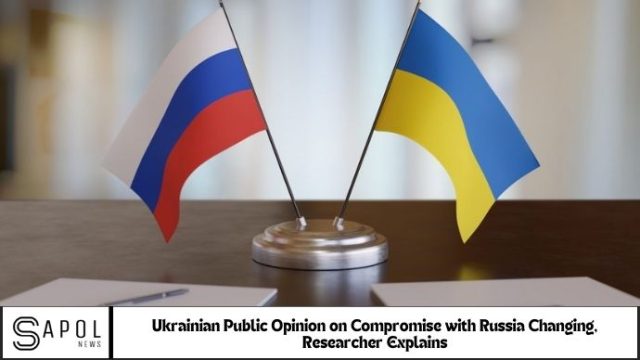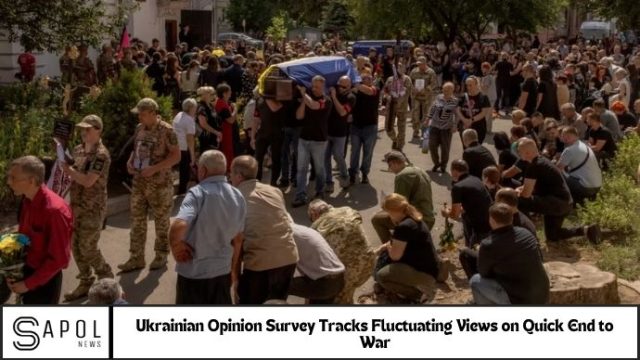Ukrainian Public Opinion on Compromise with Russia Changing, Researcher Explains
Ukrainian Public Opinion on Compromise with Russia Changing, Researcher Explains Two years and seven months into Russia’s invasion of Ukraine, public sentiment in Ukraine is gradually shifting regarding the prospect of ending the conflict.
Gerard Toal, an international affairs expert at Virginia Tech, has spent over a decade studying Ukrainian public opinion. His latest research reveals a growing openness among Ukrainians toward negotiating with Russia.
“This shift comes from a place of hardship, not peace,” Toal explains. “Ukrainians do not want to lose, and they don’t want to concede territory to Russia. However, an increasing number, though still not a majority, are acknowledging that some concessions might be necessary to bring the war to an end.”
Toal discusses the evolution of public opinion and what the future might hold for Ukraine in this context.
How Has Ukrainian Public Opinion Changed Over Time?
Toal notes, “We’ve been tracking public opinion in Ukraine for years. After Russia’s invasion in February 2022, there was initially some openness to negotiations. But the discovery of war crimes in Bucha and Irpin in April 2022 hardened those views. Despite that, the war’s prolonged suffering has led to a shift. More Ukrainians are now expressing support for a ceasefire and settlement, even if that involves territorial losses.”
What Challenges Did You Face in Conducting These Surveys?
“Surveying public opinion in wartime is extremely challenging,” Toal explains. “Our Ukrainian research partner faced significant obstacles, including difficulties reaching people, reluctance to speak, and unreliable power supplies. The results we have offer a snapshot of public sentiment, but they don’t capture the full complexity. Many voices are likely missing—people without phones, those hesitant to talk to strangers about the war, or those who simply don’t feel comfortable sharing their true opinions. These factors must be considered.”
What Are the Main Causes Behind the Shifts in Public Opinion?
Toal attributes the shifts in sentiment to “the cumulative human and material toll of the war.” Additionally, he points to the blockage of U.S. aid by the U.S. House of Representatives, which acted as a wake-up call for many Ukrainians. “This led to the realization that international support might not always be guaranteed. Ukrainians didn’t choose this war—it was forced upon them.”
The Changing Landscape of Ukrainian Public Opinion
Historically, Ukrainians have been highly resistant to any form of compromise with Russia due to Russia’s annexation of Crimea in 2014 and the ongoing conflict in eastern Ukraine. According to recent surveys, however, this steadfast stance is now undergoing noticeable changes.
Key Factors Behind the Shift:
- War Fatigue: After nearly a decade of conflict, war fatigue has set in. Economic strain, along with the physical and emotional toll of the war, has led some Ukrainians to reconsider the long-term viability of continuing the fight without a diplomatic resolution.
- Casualty Numbers: High casualties, particularly among civilians, have caused many to question the effectiveness of ongoing military operations. According to the Ukrainian Ministry of Defense, over 60,000 Ukrainian soldiers have died since the beginning of the 2022 invasion, contributing to a shift in public sentiment.
- Economic Impact: The war has severely impacted Ukraine’s economy, with GDP expected to shrink by 30% in 2025. This economic strain forces many to rethink the costs of prolonged conflict and the potential benefits of negotiating peace.
Research Insights into the Changing Mindset
Experts from institutions like the Ukrainian Institute of Strategic Studies and the Razumkov Center have pointed out that younger generations, who didn’t live through the Soviet era, tend to support negotiations more than their older counterparts. This generational divide highlights the evolving national identity and the shifting priorities of Ukraine’s younger population.
Public Opinion: What Ukrainians Really Think About Compromise
Several surveys conducted in 2024 revealed that nearly 45% of Ukrainians now believe that some form of negotiation with Russia might be necessary to end the war. This is a significant shift from just two years ago when only 25% of the population was open to discussions with Moscow.
Breakdown of Opinions:
- 45% Support Negotiation: The group that now sees a need for some form of dialogue is primarily driven by economic hardships and civilian losses.
- 38% Remain Opposed: Many older citizens and those living in conflict zones still firmly believe in military victory over any form of concession to Russia.
- 17% Undecided: These individuals are uncertain, swayed by current developments and unclear outcomes.
What This Means for Ukraine’s Future
This change in public opinion has profound implications for Ukraine’s strategy moving forward. Researchers warn that the shift towards compromise could be a double-edged sword. On one hand, negotiations might lead to a peaceful resolution and an end to the devastation. On the other hand, giving in to Russian demands might be seen as a betrayal of Ukrainian sovereignty and democracy, risking future political instability.
Conclusion
As Ukrainian public opinion on negotiating with Russia continues to evolve, the country faces crucial decisions about its future direction. While some may view compromise as necessary for peace, others remain committed to the fight for full territorial integrity and sovereignty. Ultimately, the resolution will depend not only on the will of the people but also on the international community’s support and the ongoing realities on the battlefield.
FAQs:
Why is Ukrainian public opinion shifting towards compromise?
Economic strain, high casualties, and war fatigue are leading many Ukrainians to reconsider the costs of continuing the conflict.
How many Ukrainians support negotiating with Russia in 2024?
Around 45% of Ukrainians now support some form of negotiation, up from 25% in 2022.
What role do younger Ukrainians play in this shift?
Younger Ukrainians, who didn’t experience Soviet rule, are more likely to support negotiations with Russia.
What is the impact of the war on Ukraine’s economy?
Ukraine’s GDP is expected to shrink by 30% in 2025 due to the ongoing conflict.
What are the risks of compromising with Russia?
There is a risk that compromise could be seen as undermining Ukraine’s sovereignty and lead to political instability.
What is the outlook for Ukraine’s future negotiations?
The future of negotiations will depend on the balance between military outcomes and public sentiment, as well as international support.


